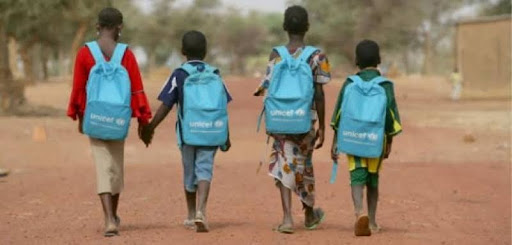Child Soldiers: UNICEF Commends CJTF’s Delisting From UN General Secretary’s List
The commendation from UNICEF comes after the CJTF released more than 2,000 children from its ranks and their commitment to the implementation of an Action Plan it signed in 2017.

The United Nations Children’s Fund (UNICEF) has commended the delisting of the Civilian Joint Task Force (CJTF) from the United Nations Secretary-General’s report as one of the armed groups recruiting and using children for conflict in Northeast Nigeria, describing it as one step forward for child protection.
In a statement on Monday, Oct. 18, UNICEF said Antonio Guterres, UN Secretary-General, had in his latest report released this year, credited the delisting to a significant reduction in the number of children recruited into the ranks of the CJTF and the armed group’s commitment to the implementation of an Action Plan it signed with the United Nations Country Task Force on Monitoring and Reporting (CTFMR) in 2017, to stop the recruitment and use of children.
Formed in 2013 with the aim of supporting efforts of the Nigerian military to protect communities from Boko Haram attacks, the CJTF expanded in size and influence in the region.
At the height of its operations in 2016, the CJTF, according to the UNICEF statement, was listed in the annexes of the Secretary- General’s Annual Report for Children and Armed Conflict for the recruitment and use of children.
It noted that, since signing the 2017 Action Plan, however, the CJTF has released more than 2,000 children from its ranks, with many of the children enrolled in school and provided with psychosocial support by UNICEF.
“Children have borne the brunt of the protracted conflict in north-east Nigeria. At least 3,500 young children were recruited by parties to the conflict as combatants between 2013 and 2020,” UNICEF said in the statement. “ Girls and boys have been used as suicide bombers, spies, labourers, cooks, messengers and wives. Girls recruited by armed groups often suffer gender-based¹violence, including rape.”
It said children used as soldiers are at a great risk of death or disability while undergoing armed training and initiation rites, as well as during combat. “They are forced to witness or participate in tortures and killings, triggering lifelong physical and mental health challenges. Similarly, they are denied access to education, nutrition and conducive living conditions, among other grave violations of their rights.”
“This is a welcome development for the children of Nigeria,” said Phuong T. Nguyen, UNICEF Chief of Maiduguri Field Office.
“But we must remember that this is the first step in a long journey. I urge the leadership of the CJTF to establish child protection units across its offices to prevent future recruitment and use of children and consistently model its agreement to not use children for any kind of role.”
“Recruiting children into armed groups steals their innocence and the protection they need. Deploying children as soldiers imperils peace and perpetuates the cycle of generational violence. I call on other armed groups and parties to the conflict to immediately stop the recruitment of children and safely reintegrate them with their families and communities, where they belong,’’ said Nguyen.
Support Our Journalism
There are millions of ordinary people affected by conflict in Africa whose stories are missing in the mainstream media. HumAngle is determined to tell those challenging and under-reported stories, hoping that the people impacted by these conflicts will find the safety and security they deserve.
To ensure that we continue to provide public service coverage, we have a small favour to ask you. We want you to be part of our journalistic endeavour by contributing a token to us.
Your donation will further promote a robust, free, and independent media.
Donate HereStay Closer To The Stories That Matter




